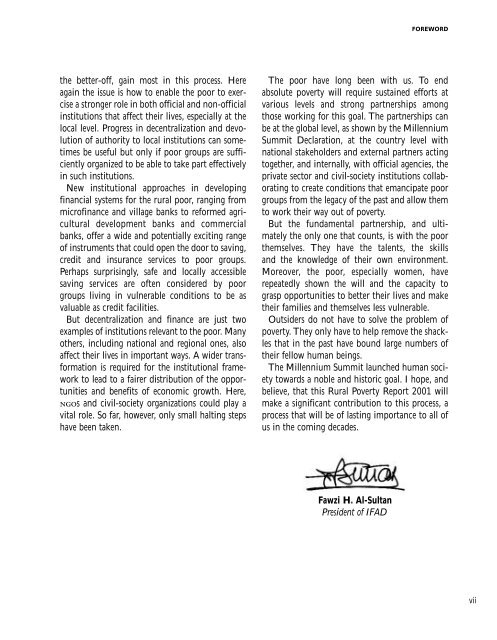THE CHALLENGE OF ENDING RURAL POVERTY - IFAD
THE CHALLENGE OF ENDING RURAL POVERTY - IFAD
THE CHALLENGE OF ENDING RURAL POVERTY - IFAD
You also want an ePaper? Increase the reach of your titles
YUMPU automatically turns print PDFs into web optimized ePapers that Google loves.
FOREWORD<br />
the better-off, gain most in this process. Here<br />
again the issue is how to enable the poor to exercise<br />
a stronger role in both official and non-official<br />
institutions that affect their lives, especially at the<br />
local level. Progress in decentralization and devolution<br />
of authority to local institutions can sometimes<br />
be useful but only if poor groups are sufficiently<br />
organized to be able to take part effectively<br />
in such institutions.<br />
New institutional approaches in developing<br />
financial systems for the rural poor, ranging from<br />
microfinance and village banks to reformed agricultural<br />
development banks and commercial<br />
banks, offer a wide and potentially exciting range<br />
of instruments that could open the door to saving,<br />
credit and insurance services to poor groups.<br />
Perhaps surprisingly, safe and locally accessible<br />
saving services are often considered by poor<br />
groups living in vulnerable conditions to be as<br />
valuable as credit facilities.<br />
But decentralization and finance are just two<br />
examples of institutions relevant to the poor. Many<br />
others, including national and regional ones, also<br />
affect their lives in important ways. A wider transformation<br />
is required for the institutional framework<br />
to lead to a fairer distribution of the opportunities<br />
and benefits of economic growth. Here,<br />
NGOs and civil-society organizations could play a<br />
vital role. So far, however, only small halting steps<br />
have been taken.<br />
The poor have long been with us. To end<br />
absolute poverty will require sustained efforts at<br />
various levels and strong partnerships among<br />
those working for this goal. The partnerships can<br />
be at the global level, as shown by the Millennium<br />
Summit Declaration, at the country level with<br />
national stakeholders and external partners acting<br />
together, and internally, with official agencies, the<br />
private sector and civil-society institutions collaborating<br />
to create conditions that emancipate poor<br />
groups from the legacy of the past and allow them<br />
to work their way out of poverty.<br />
But the fundamental partnership, and ultimately<br />
the only one that counts, is with the poor<br />
themselves. They have the talents, the skills<br />
and the knowledge of their own environment.<br />
Moreover, the poor, especially women, have<br />
repeatedly shown the will and the capacity to<br />
grasp opportunities to better their lives and make<br />
their families and themselves less vulnerable.<br />
Outsiders do not have to solve the problem of<br />
poverty. They only have to help remove the shackles<br />
that in the past have bound large numbers of<br />
their fellow human beings.<br />
The Millennium Summit launched human society<br />
towards a noble and historic goal. I hope, and<br />
believe, that this Rural Poverty Report 2001 will<br />
make a significant contribution to this process, a<br />
process that will be of lasting importance to all of<br />
us in the coming decades.<br />
Fawzi H. Al-Sultan<br />
President of <strong>IFAD</strong><br />
vii

















